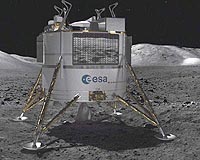 |
Washington (AFP) July 20, 2009 The United States marks the 40th anniversary of the historic first moon walk Monday, with President Barack Obama meeting at the White House with the crew of the Apollo 11 mission. The crew became the first to accomplish the dream of ages and walk on the surface of the moon -- an endeavor now remembered at a time when future US dominance in space has become far less certain. "That's one small step for man, one giant leap for mankind," said astronaut Neil Armstrong as he stepped down from the lunar lander onto the moon's Sea of Tranquility on July 20, 1969. An estimated 500 million people on Earth crowded round televisions and radios. Astronauts from the Apollo program will attend a news conference in Washington Monday. And there will be a simultaneous broadcast to science centers across the United States about the Apollo legacy and the future of space exploration. The Kennedy Space Center at Cape Canaveral, Florida, where the Apollo 11 mission blasted off, will join the celebrations, as will the mission control at Johnson Space Center in Houston, Texas and Washington's National Air and Space Museum. The lunar landing was a huge morale boost for a country mired in the Vietnam war and on edge because of the Cold War, ushering in a new sense of confidence and challenging concepts of science and religion. "That was a proud moment, to be a military person and to salute that (US) flag on the surface of the moon," astronaut Buzz Aldrin told the Fox News Sunday program. Aldrin, second after Armstrong to step onto the moon, said what stayed with him most was a realization, upon touchdown, of the scope of what he and the rest of NASA had achieved. "What I want to remember most is the glance between Neil and myself, with the engine shutoff, just those seconds after we touched down, because we had just completed the most critical door opening for exploration in all of humanity," Aldrin said. But the US space agency NASA's ambitious plans to put US astronauts back on the moon by 2020 to establish manned lunar bases for further exploration to Mars under the Constellation project are increasingly in doubt. Other nations such as Russia, China and even India and Japan are meanwhile expanding their own space programs. "I think we are at an extremely critical juncture as we celebrate this anniversary because, we at least in the US are in the process of deciding... what is the future of humans in space," said John Logsdon, an expert in aerospace history at the Air and Space Museum. The cost of Constellation is put at about 150 billion dollars, but estimates for the Ares I launcher to put the project into orbit have skyrocketed from 26 billion dollars in 2006 to 44 billion dollars last year. The mounting costs prompted Obama, soon after he took office, to order a close examination of the program. A blue-ribbon panel of experts headed by former Lockheed Martin CEO Norman Augustine is due to issue recommendations in late August. "With a few exceptions, we have the technology or the knowledge that we could go to Mars if we wanted with humans," Augustine said recently. "We could put a telescope on the moon if we wanted," he said. Only 12 men, all Americans, have ever walked on the moon, and the last to set foot there were in 1972, at the end of the Apollo missions. NASA's budget is currently too small to pay for Constellation's Orion capsule, a more advanced and spacious version of the Apollo lunar module, as well as the Ares I and Ares V launchers needed to put the craft in orbit. With a space exploration budget of six billion dollars in 2009, Senator Bill Nelson of Florida, a former astronaut, said: "NASA simply can't do the job it's been given." Democrat Barney Frank, who is chairman of the House Financial Services Committee, is one of the budget skeptics. "Manned space travel adds far more cost than is justified in terms of scientific return," he said recently. To recapture one of mankind's most dramatic moments, NASA last week unveiled restored video footage of key moments from the Apollo 11 mission. And the record of America's crowning achievement remains visible on the moon -- in the shape of astronauts' footprints. Share This Article With Planet Earth
Related Links Mars News and Information at MarsDaily.com Lunar Dreams and more
 Europe cautious about moon return
Europe cautious about moon returnParis (AFP) July 20, 2009 The European Space Agency (ESA), on the 40th anniversary of the first lunar landing, said Monday any return to the moon had to be more than a flag-planting mission and multinational cooperation was key. ESA Director-General Jean-Jacques Dordain said that in 1969, Apollo 11's exploit was seen in terms of superpower rivalry, but today perceptions had changed. "I think the most important ... read more |
|
| The content herein, unless otherwise known to be public domain, are Copyright 1995-2009 - SpaceDaily. AFP and UPI Wire Stories are copyright Agence France-Presse and United Press International. ESA Portal Reports are copyright European Space Agency. All NASA sourced material is public domain. Additional copyrights may apply in whole or part to other bona fide parties. Advertising does not imply endorsement,agreement or approval of any opinions, statements or information provided by SpaceDaily on any Web page published or hosted by SpaceDaily. Privacy Statement |